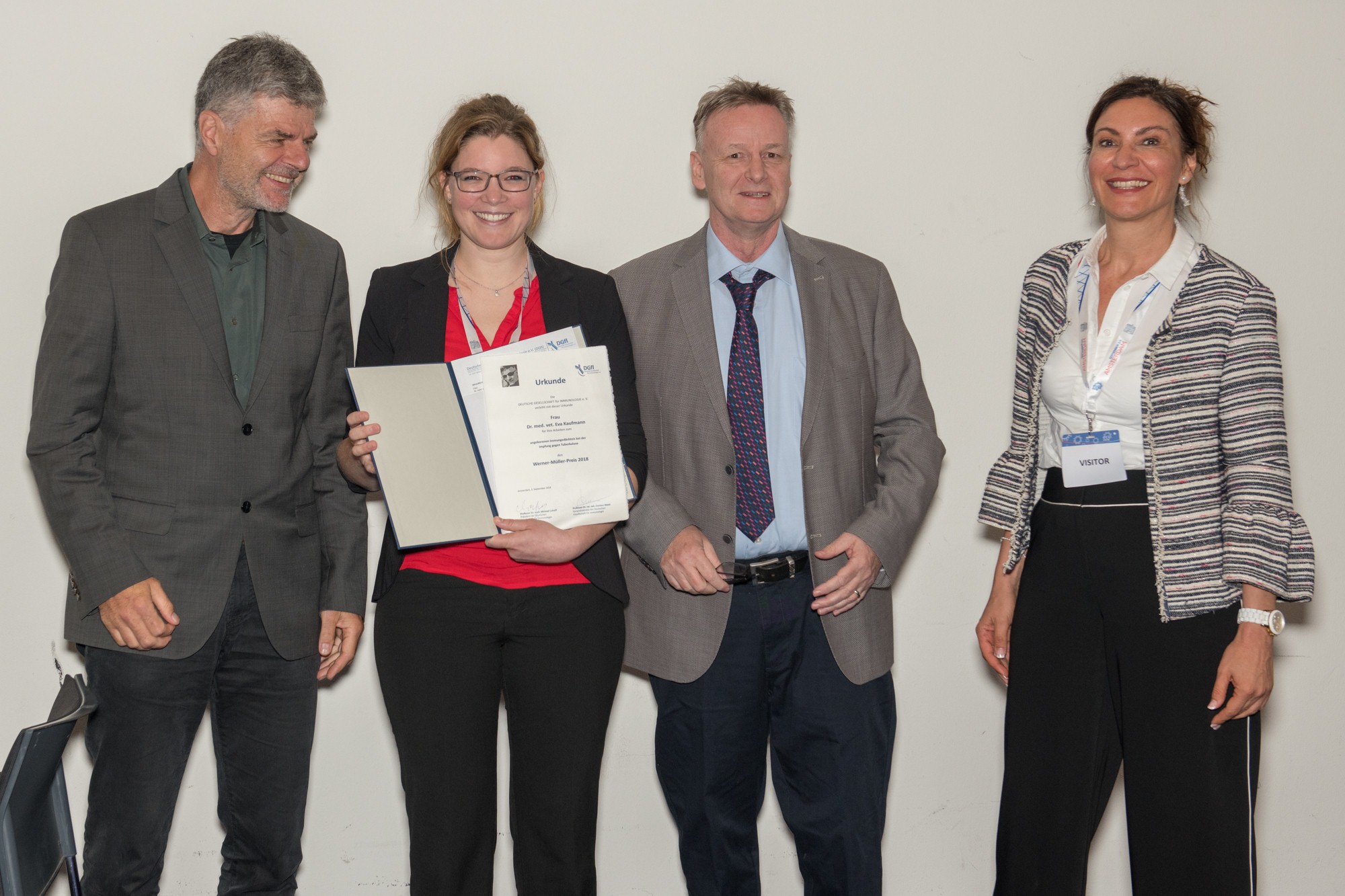
(Herbert Fischer Prize) and Dr. Jan Böttcher (Fritz-und-Ursula Melchers Postdoctoral Prize). Image: J. Hirscher
Source: German Society for Immunology
Dr. Eva Kaufmann, a postdoctoral student in the lab of Dr. Maziar Divangahi at McGill was recently presented with the Werner-Müller-Prize from the German Society for Immunology. Each year, the German Society for Immunology awards two doctoral and three early-career prizes to young scientists who have made an outstanding contribution in the field of immunology. The award ceremony took place on September 3, 2018 during the 5th European Congress of Immunology in Amsterdam.
Dr. Kaufmann received the prize for her work describing a new mechanism for protection against tuberculosis with the vaccine Mycobacterium bovis Bacillus Calmette-Guérin (BCG). Tuberculosis is an infectious disease caused by mycobacteria. With approximately 1.7 million deaths per year, the disease is one of the ten most frequent causes of death worldwide. BCG is so far the only tuberculosis vaccine approved worldwide.
The vaccine consists of attenuated, non-infectious bovine tuberculosis bacteria that are used as live vaccines. It is known that macrophages play a decisive role in the defence against tuberculosis infections. Unfortunately, macrophages are very short-lived. Therefore, vaccine strategies directly targeting macrophages would have only a limited effect on the generation of long-term immunological memory.
In contrast to macrophages, their precursor cells, the hematopoietic stem cells (HSC) in the bone marrow, are very long-lived. HSC generate all cells of the blood system. Dr. Kaufmann’s work in the mouse model shows that the access of BCG to the bone marrow leads to a reprogramming of HSCs. This leads to the formation of macrophages that provide improved protection against tuberculosis (Cell. 2018; doi: 10.1016/j.cell.2017.12.031). These observations show that HSC represents new targets for vaccine development, and thus open up innovative prophylaxis approaches for tuberculosis and possibly other infectious diseases.
Dr. Kaufmann studied veterinary medicine at the Justus-Liebig-University (JLU) Giessen and did her doctorate in the group of Max Bastian at the Paul-Ehrlich-Institute and with Rolf Bauerfeind at the Institute for Hygiene and Infectious Diseases of Animals at the JLU Giessen. She has been working in Dr. Divangahi’s group at McGill as a postdoc since 2016.
The German Society of Immunology awards the Werner-Müller-Prize to its members for the first time this year. The prize is awarded once a year to young postdocs (max. 4 years after receiving their doctorate) for their achievements in the field of immunology, which may be useful for the prevention, diagnosis or treatment of diseases in developing countries. Nominations must be accompanied by a peer review publication in which the applicant has made a significant contribution.
The prize is named after Werner Müller, a pioneer who was involved in the development of the first mouse strains that produce humanised antibodies and countless other transgenic mice that are used all over the world. He is a founding member of the IMGT database and holds the Bill Ford Chair of Cellular Immunology at the University of Manchester, UK. Sponsor of the award is Trianni, Inc.
Congratulations Dr. Kaufmann!
